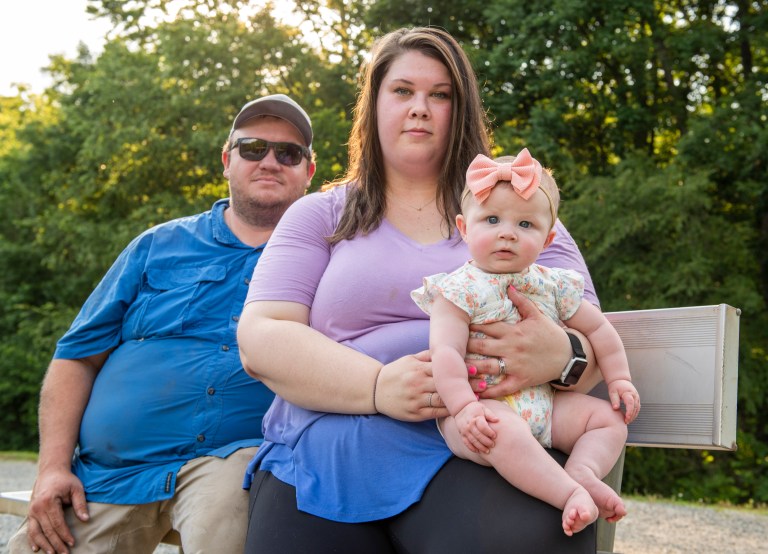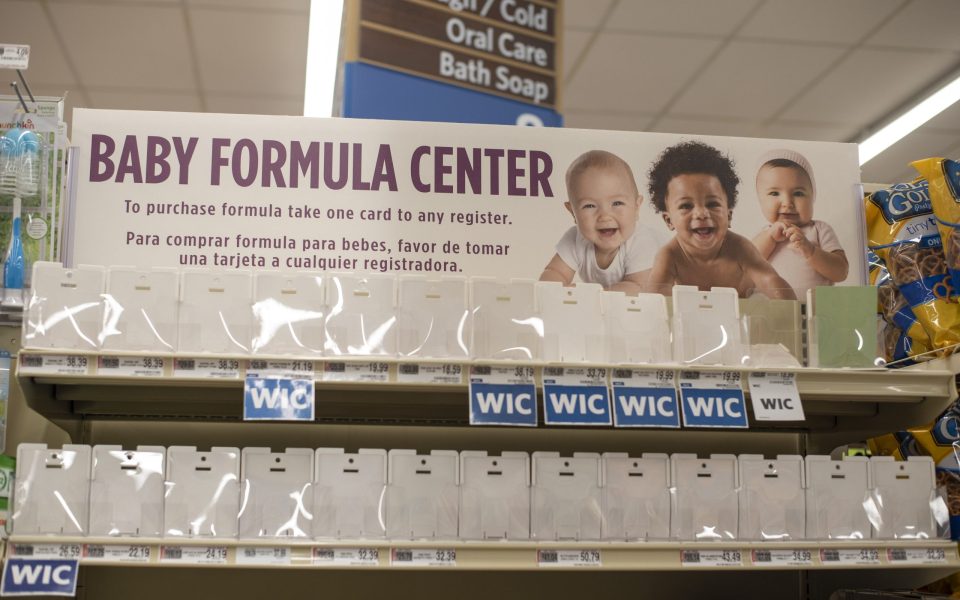Featured photo: Shelves meant for baby formula remain empty as a nationwide shortage hits the Triad (photo by Juliet Coen)
As parents across the country scramble through stores, desperately looking for formula for their children, those in the Triad are no exception. The shortage, initially started by an Abbott brand recall, is creating stress and fear among local parents of infants, myself included. I’ll be having my second daughter in June, and while I hope and plan to breastfeed for at least few weeks, due to medical conditions, I won’t be able to much longer than that. This means I’ll need formula in the very near future, which is hard to come by these days. Like many parents, I’ve had a difficult time finding formula on store shelves. According to Datasembly, there is now a 40 percent decrease in infant formula available in stores nationwide since the Abbott recall in February.
In the Triad, parents are sharing their stories of how they’re dealing with the issue while experts share options and resources for those needing formula.
Local parents commiserate on the current formula shortage
When Victoria Idol had her third child in January, she had no idea that the formula shortage would take place in a few months, wreaking havoc on her family’s life. Her son is now four months old, and they are constantly dealing with the “nightmarish scavenger hunt” of finding products he needs.
Two ways they’ve made it through the shortage is by having family and friends scout out different stores and pharmacies and by being flexible when it comes to which brands to buy. While most parents prefer to stick to a brand they know that their baby accepts easily, this shortage has made that impossible for many moms like Idol.

“After searching multiple stores with no luck, I sat in my car in the parking lot and cried,” Idol says. “I was heartbroken for myself and all the other moms who were sharing the same battle. I knew if I was struggling to feed my baby then hundreds of other moms were too.”
It was during yet another disappointing trip to multiple stores that yielded no formula that pushed Idol to a breaking point. In that moment she was inspired to create the Facebook group, Formula Finders of the Triad, which she began on May 13.
“I thought if I could find a way to connect us all together, we could help each other and feed our babies,” Idol says. “A mother’s love conquers all and if you gather hundreds of mamas together, we can accomplish anything.”
The group currently has more than 350 members and parents are sharing photos of stores where they find formula as well as giving away or selling formula they do not need.
“When I started this group, I really didn’t think it would grow to what it is,” Idol says. “But I am so thankful that moms have a way to connect and spread love, support, and formula.”
Facebook has become one of the more popular places where support groups have popped up to help parents find formula. There are other groups, both nationwide and statewide, on Facebook that have a thousand or more parents. Formula Finders, a nationwide Facebook group, has well over 1,600 members and Formula Finders (NC) Facebook group has membership that exceeds 1,700. Both groups were started in April.
Like many other parents, Jessie DeLapp had to turn to online groups after the Abbott/Similac recall in early spring made it difficult to find formula for her daughter, born in December 2021. In fact, all of the cans that DeLapp had been buying up until that point were part of the recall, so she was forced to find all new formula.
At first, her family was able to find a generic brand relatively easily. But as time progressed and the shortage grew larger, it became harder to find.
“I couldn’t find her formula in the stores at all,” DeLapp says. “I searched everywhere and no formula. I pulled up the store’s app on my phone and bookmarked it on my MacBook. I would check hourly and several times throughout the night, hoping to catch when they restocked online or in store. No matter how much I looked, nowhere had formula.”

DeLapp eventually resorted to reaching out on Facebook groups to see if anyone was selling formula. After extensive searching she found someone selling the formula she needed. Unfortunately, the seller was in Indiana and DeLapp had to pay $30 to ship just eight cans to the Triad.
Her advice to other parents searching for formula is to join formula-finding Facebook groups, like the one Idol started. She also recommends asking family and friends, no matter where they live, to be on the hunt for formula as well.
For mothers like April Mattina whose 6-month-old child was born premature, the formula shortage is even more dire. While many parents are looking for any formula they can find, some babies, like hers, require specific high-calorie formulas.
“It has been stressful,” Mattina shares. “On top of everything else going on in the world, we now have to worry about running out of formula for our infant. We have had to drive to different stores and cities to find formula.”
Luckily, her child’s doctor recently said it was okay to take him off a special formula, but due to stomach sensitivities he still has to be on a specific kind of product. Mattina often has to resort to finding sample-size cans in Facebook groups, which don’t last long.
Mattina says she has found hope and inspiration in the many moms that have stepped up for others throughout this crisis.
“I have met many nice moms out there who have given away formula to others and myself,” she says. “There is so much negativity in the world and it warms my heart to see people helping others. Hopefully we will see an end to the shortage soon, but when the time comes for my youngest to be done with formula if we have any leftover, I will be donating it.”
Racial disparities, online harassment contribute added stress
According to the CDC, 85.5 percent of white parents, 87.4 percent of Hispanic parents and 73.6 percent of Black parents breastfeed their children. This indicates that Black parents have a higher need for formula and are likely to be more impacted by the shortage. Furthermore, lower-income families that are eligible for and are receiving WIC benefits are only allotted a certain amount of formula within a set timeframe. That means they cannot ‘stock up’ and are only able to purchase what formula they are able to find, if any.
In addition to racial or socioeconomic disparities that parents may face, biased societal expectations around breastfeeding is causing an increase in online harassment towards parents, too.
Susan M., who is choosing to go just by her last name for privacy, has a preemie baby who requires special formula. In her search for formula, Susan has experienced online strangers who have harassed her and other parents.
“It is extremely hurtful to read comments online saying ‘If only there was a way for mothers to feed their babies without formula? Stop being lazy and nurse your baby,’” she says. “It has nothing to do with laziness and everything to do with health. I’d give anything to be able to provide all the calories my daughter needs. I’ve done everything to try to increase my supply including working with lactation, nursing on demand, baby wearing, power pumping, increased hydration, and supplements, that ultimately made me sick, but nothing works.”

Mother Alicia McIntosh, who is feeding her 6-month-old with a combination of breastfeeding and formula, has witnessed harassment firsthand too.
“I have seen a lot of people saying that women need to start breastfeeding,” McIntosh says. “I would like those people to know that not everyone can, as not all babies will nurse, and some women have production problems.”
For now, McIntosh has found that generic brands are working as well as brand names and encourages other moms to utilize those if they can. At the end of the day, Idol, who has also witnessed harassment, says that the goal is to be able to feed your child.
“Fed is best,” Idols reminds others. “Even in this scary time of having an infant, people still find ways to ‘mom shame’. Breastfeeding is an incredible thing but not all are capable, or it doesn’t work for every baby or mom. As for myself, I breastfed for the first few weeks, then I had to pump because my son refused to latch. My supply died off fast. Always remember, how a mom decides to feed her baby is her choice.”
Triad experts provide advice during the shortage
Dr. Tammie Wiley from Winston-Salem Pediatrics says if parents can’t find formula in stores or pharmacies, check with WIC or HHS.gov. When purchasing online only buy from well-recognized distributers. Be mindful that there is no guarantee that donor milk is safe, especially if not purchased through an accredited milk bank. Check healthychildren.org for up-to-date information on donor milk.
Wiley also cautions parents against making their own formula or watering formula down no matter how tempting it can be.
“Do not every try to make your own formula or water formula down as this is very hazardous to babies, and potentially life-threatening,” Wiley says. “If your baby is older than 6 months, providing whole milk is a potential option for under a week time span. But, in that scenario always check with your pediatrician first. Finally, please do not stockpile as that only aids in the shortage. I recommend keeping an ongoing 10-to-14-day supply.”

Beth Sanders of Greensboro Lactation Consultants shares more tips for helping formula last longer.
“One way to help during the formula shortage is for parents to only make the amount that the baby needs at that time,” she says. “This minimizes waste and makes your supply last longer.”
Linda Coppola of Peaceful Beginnings weighs in on milk sharing and donations.
“Milk-sharing is when women donate unpasteurized breast milk via local Facebook sites such as, Eats on Feets, Human Milk for Human Babies, and Milk Sharing Mommas of the Triad,” Coppola shares. “However, there are guidelines and mothers seeking milk should ask a lot of questions about the donor and donors should be willing to provide honest answers to the questions. Recipients should not be paying for the milk via these sites, but can offer gas cards, storage bags, etc. to the donors”
Currently, there is only one accredited milk bank in North Carolina at WakeMed, located in Cary. Furthermore, their milk is mostly reserved for NICU babies in North Carolina and on the East Coast.
On breast-milk-sharing, Sanders “recommends first trying to find milk donations from close friends or family. Donated milk can be pasteurized at home using the flash heating method. For detailed instructions on how to safely prepare donated milk, refer to the Academy of Breastfeeding Medicine’s website.”
Owner of Lollies Lactation in Winston-Salem, Kacie Mintz, also shared that parents should reach out to their pediatrician for samples or ask friends who have recently had babies if they have any samples they are not using. She also pointed to the Baby Formula Exchange website which was launched by Olympian Shawn Johnson to connect those who need formula with others who have it.
Another option for parents is relactation, or the process of restarting a parent’s milk supply after they have stopped breastfeeding or given birth. However, Mintz shares that relactation while possible, is difficult and not always successful.
“Support, a quality breast pump and a plan with an International Board-Certified Lactation Consultant are critical in relactation success,” Mintz says. “Realistic expectations and reasons for not currently lactating need to be considered before trying to relactate. The time frame post-birth is not the most pivotal indicator of reestablishing milk supply, but it is usually more successful the closer you are from birth. Relactation is time intensive, not immediate, and sometimes will not meet the supply requirements of the infant so it is not a quick fix.”
Is there an end in sight for the formula shortage?
Experts and parents both agree they are unsure when the formula shortage will end. It is currently an issue Congress is addressing. Rep. Kathy Manning of District 6 recently voted in favor of both the Infant Formula Supplemental Appropriations Act, H.R. 7791 and the Access to Baby Formula Act, H.R. 7790.
The Infant Formula Supplemental Appropriations Act will provide the Food and Drug Administration with $28 million in funding to address the current formula shortage and prevent any future shortages. The Access to Baby Formula Act will help low-income families have better access to formula by allowing the US. Department of Agriculture (USDA) to waive certain WIC requirements. The North Carolina Department Health and Human Services recently updated their WIC program on May 31 to allow WIC families to purchase two other types of Gerber formula as well as products in bigger sizes.
On May 12, President Biden’s administration publicized efforts to help during the formula shortage. The first is aimed at simplifying the process for formula makers to allow for a quicker production process. The second keeps retailers from increasing formula prices at a time when parents need it most. Finally, the FDA will begin working with other countries to import more formula. Typically, the U.S. produces 98 percent of the formula it consumes and Mexico, Chile, Ireland, and the Netherlands are the only other major countries for formula imports. As part of these import efforts some airlines, such as United Airlines, have stepped up to offer free flights transport products.

To get through this crisis, mother Jessie DeLapp says mothers and parents will need ongoing support.
“It’s incredibly important to simply support people taking care of infants right now,” DeLapp says. “This is an extremely hard time that none of us could have ever predicted. If someone formula feeds, support them. If they breastfeed, also support them. Times are hard enough, just be kind.”
Join the First Amendment Society, a membership that goes directly to funding TCB‘s newsroom.
We believe that reporting can save the world.
The TCB First Amendment Society recognizes the vital role of a free, unfettered press with a bundling of local experiences designed to build community, and unique engagements with our newsroom that will help you understand, and shape, local journalism’s critical role in uplifting the people in our cities.
All revenue goes directly into the newsroom as reporters’ salaries and freelance commissions.


Leave a Reply